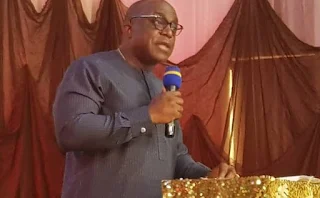Entrepreneur and Chairman of The Dome Entertainment Limited, Dr. Obiora Okonkwo has urged President Muhammadu Buhari and leadership of the National Assembly to work towards a more integrated country so as to take advantage of its diversity.
Okonkwo made the call in Enugu, weekend, during a Nigeria Union of Journalists (NUJ) colloquium on ‘Media and National Integration”.
He noted that in the light of Nigeria’s enormous challenge with national integration, efforts must start with the recognition that despite the country’s many differences, Nigerians have no other country they can call theirs and must therefore do everything they can to live together.
“It therefore, behoves on the media to strive to promote those things that unite the nation while constructively addressing the more divisive issues”, he stated.
He said that in performing other roles, the media must at all times live up to its watchdog role of holding the government’s feet to the fire, stressing that the moment the media fails in such core responsibility, it loses its relevance especially with the citizens and then becomes a lapdog.
“You may not be aware of this, but most Nigerians in their despondency, still look up to the media as the only group that can help save them from Nigeria’s political leadership. This is a trust you must never take for granted. Today, we have very powerful online radio personalities whose intervention with powerful government officials have become the last hope of the common man. They have lost hope in our legal system and look up to the likes of Ordinary Ahmed of Human Rights Radio Abuja for help,” Okonkwo said.
He urged the media to be encouraged in the task of promoting national integration, insisting that Nigeria’s situation was not unique as many countries remain work in progress.
“We cannot abandon the task of building ours even in the face of daunting challenges. That is the task for the mass media and all of us. It was a group of brave young journalists who defied all odds and used their pen to defeat the British colonial empire. Today’s journalists can again lead the charge for a strong, united and prosperous Nigeria. It may sound impossible, but as the master of political miracles, the great Nelson Mandela once said, it always seems impossible until it is done,” Okonkwo charged.
The Colloquium which was chaired by Senator Anyim Ude, also had former Nigerian envoy to Spain, Amb. Bianca Ojukwu, Chairman of Enugu Traditional Rulers council, HRH Lawrence Agubuzu and a representative of the state governor, in attendance.
Speaking further, Okonkwo, whose lecture was punctuated with rounds of applause, noted that for the country to achieve its vision of full integration, the media must be firm to its role and also use its powers to build the country rather than destroy it.
He noted that present challenges in the country can be surmounted if the media pushed a positive narrative that would encourage investments and partnerships.
He said: “It took the genius and labour of people to build so many of the world’s greatest countries, many of which remain work in progress as Americans often speak of still working towards a more perfect union.
“We cannot abandon the task of building ours even in the face of daunting challenges. That is the task for the mass media and all of us. It was a group of brave young journalists who defied all odds and used their pen to defeat the British colonial empire.
“Today’s journalists can again lead the charge for a strong, united and prosperous Nigeria. It may sound impossible, but as the master of political miracles, the great Nelson Mandela once said, ‘it always seems impossible until it is done’”.
Okonkwo also tasked the media to hold the government accountable in defining regime interest and national interest, which he said must be clearly defined and separated.
“In playing this watchdog role, the media must make a distinction between regime interest and national interest and between regime security and national Security. The tendency is for people in government to conflate both. But what is in the regimes’ interest may not necessarily be in the national interest. Same applies to regime security. It is never the case that those in government have a monopoly of patriotism.
“While media owners, as part of the ruling political and economic elites, would sometimes want to use their media to further their personal interests, it is incumbent on the journalists not to be willing tools to subvert the unity of the country. The patriot in every journalist should eschew divisive and hateful rhetoric that could foster animosity among segments of the country, especially with respect to ethnic and religious matters which are two of the most problematic identities in Nigeria.
“Journalists and the mass media wield enormous power and influence and with that, must come responsibilities and deep introspection. Media must at all time promote national citizenship over other more parochial and divisive identities.
“As a large country with complex diversity challenges, many of which remain unresolved breeding frustration among citizens, media must be in the vanguard of efforts to create a new imaginary; by showcasing the immense possibilities of this country which if well harnessed, can lead to a restoration of hope.
“It starts with striking a somewhat optimistic tone in reporting of what is, and what can be. This can help Nigerians rise beyond their differences. But it starts with staying true to your calling by holding the leadership accountable and not trying to hob-nob with them as is sometimes the case”, he stated.
*JOIN our alert's group | Share stories with us | Advert placement: WhatsApp | SMS: +2348033592762 *Twitter: @ITREALMS *Email: itrealms.dsa@gmail.com*




No comments:
Post a Comment